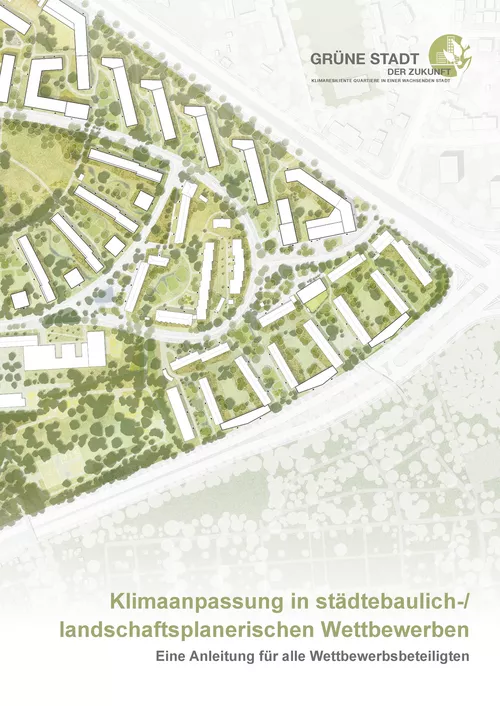Green City of the Future – climate change-resilient neighbourhoods in a growing city
In recent years, the interdisciplinary project "Green City of the Future", funded by the Federal Ministry of Education and Research, has developed solutions for dealing with the consequences of climate change in growing cities using the city of Munich as an example. In addition to the regulatory services of green infrastructure for climate adaptation and climate protection aspects in the building sector, the perspectives and potentials of urban society for a climate-adapted city were researched in six Munich city districts. Through its practice-oriented work, the research team has developed adaptation measures that can be taken at governance, building and open space level to enable effective climate adaptation and climate protection. You can find an in-depth insight into the project results of the research and development phase in our four brochures and five fact sheets (in German).

Research questions
- Which factors and instruments are effective in planning processes for the implementation of green infrastructure?
- What ecosystem services does green infrastructure (GI) provide for climate adaptation and climate protection?
- How can land requirements for green infrastructure and housing requirements be reconciled from the perspective of different target groups?
- What obstacles can hinder the implementation of green infrastructure measures and how can these be reduced?
- How can the environmental impact of building structures and technical building equipment be optimized over the life cycle of buildings?
- How does the urban population deal with increasing heat and urban density, and how can greenery help?
- How can urban quality of life be improved through green infrastructure and how can urban society be activated for this?
- How do we want green, liveable neighborhoods in the growing city in the face of climate change in the long term?
The implementation phase aims to transfer the content and results into practice. As part of this, competition processes in the city of Munich will be supported by research and practice partners and urban working principles for urban and urban land-use planning procedures will be developed with regard to climate adaptation and climate protection. These were summarized in a guide for urban planning/landscape planning competitions. In addition to questions on how green and blue infrastructure measures can be taken into account in designs and competition procedures and what responsibility the competition participants bear for this, the guide also provides information on the ideal time for integration. You can find the guide including the annexes here.
In addition, application-oriented training courses and assistance for a holistic and integrative implementation of climate adaptation and climate protection measures are developed in exchange with practitioners. The associated formats are designed for self-study and interaction in groups and are aimed primarily at planning practitioners, as well as representatives from the (housing) industry and civil society. These are now available in the form of fact sheets, checklists and guidelines at www.gruene-stadt-der-zukunft.de.

At the final conference on November 6, 2023, the four project partners presented their results and discussed with city representatives and experts how a climate-resilient future can be achieved in growing cities. A summary of the event and the presentations can be found here.
Project duration
- Definition phase: 01.05.2017 - 30.04.2018
- Research and development phase from 01.10.2018 - 30.09.2021
- Implementation phase: 01.12.2021 - 30.04.2024 (ongoing)
Project participants
- TUM (Coordination):
Chair of Energy Efficient and Sustainable Design and Building
Chair for Strategic Landscape Planning and Management
- City of Munich:
Referat für Klima- und Umweltschutz, Hauptabteilung Umweltvorsorge
Referat für Stadtplanung und Bauordnung, Hauptabteilung Stadtplanung
- Institut für ökologische Wirtschaftsforschung (IÖW), Berlin
- Ludwig-Maximilians-Universität München (LMU):
Institut für Soziologie, Arbeitsgruppe "Sozialstruktur und Umweltanpassung"

